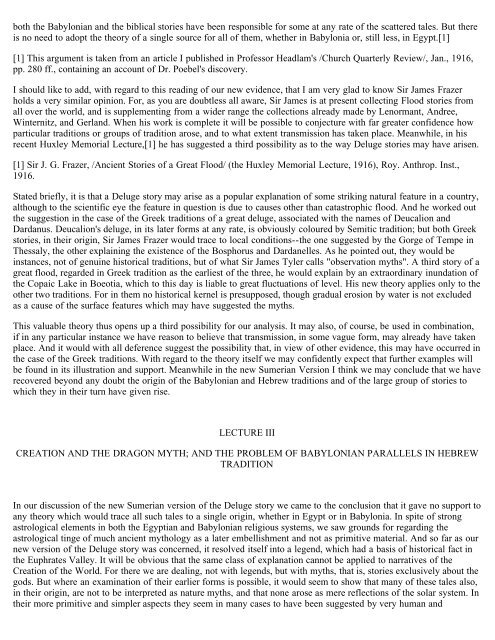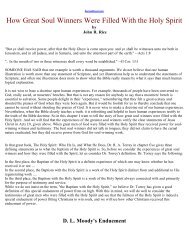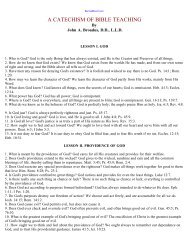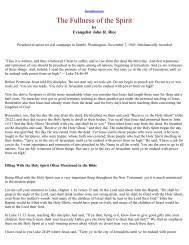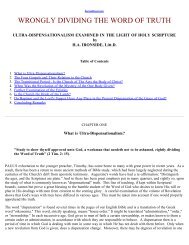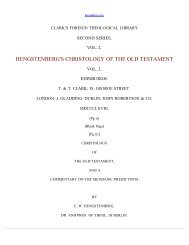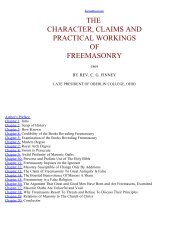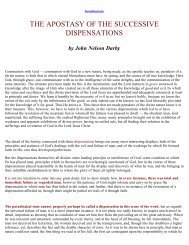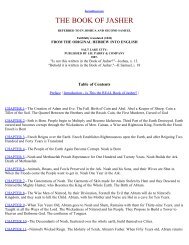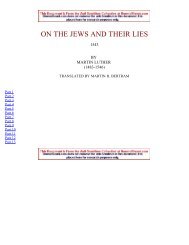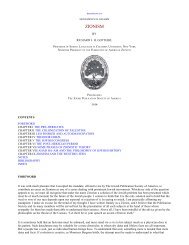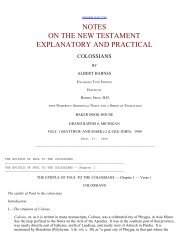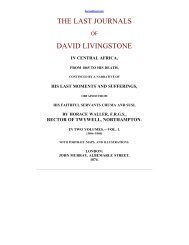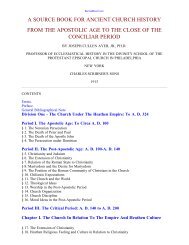Legends of Babylon and Egypt in Relation to Hebrew Tradition.pdf
Legends of Babylon and Egypt in Relation to Hebrew Tradition.pdf
Legends of Babylon and Egypt in Relation to Hebrew Tradition.pdf
You also want an ePaper? Increase the reach of your titles
YUMPU automatically turns print PDFs into web optimized ePapers that Google loves.
oth the <strong>Babylon</strong>ian <strong>and</strong> the biblical s<strong>to</strong>ries have been responsible for some at any rate <strong>of</strong> the scattered tales. But there<br />
is no need <strong>to</strong> adopt the theory <strong>of</strong> a s<strong>in</strong>gle source for all <strong>of</strong> them, whether <strong>in</strong> <strong>Babylon</strong>ia or, still less, <strong>in</strong> <strong>Egypt</strong>.[1]<br />
[1] This argument is taken from an article I published <strong>in</strong> Pr<strong>of</strong>essor Headlam's /Church Quarterly Review/, Jan., 1916,<br />
pp. 280 ff., conta<strong>in</strong><strong>in</strong>g an account <strong>of</strong> Dr. Poebel's discovery.<br />
I should like <strong>to</strong> add, with regard <strong>to</strong> this read<strong>in</strong>g <strong>of</strong> our new evidence, that I am very glad <strong>to</strong> know Sir James Frazer<br />
holds a very similar op<strong>in</strong>ion. For, as you are doubtless all aware, Sir James is at present collect<strong>in</strong>g Flood s<strong>to</strong>ries from<br />
all over the world, <strong>and</strong> is supplement<strong>in</strong>g from a wider range the collections already made by Lenormant, Andree,<br />
W<strong>in</strong>ternitz, <strong>and</strong> Gerl<strong>and</strong>. When his work is complete it will be possible <strong>to</strong> conjecture with far greater confidence how<br />
particular traditions or groups <strong>of</strong> tradition arose, <strong>and</strong> <strong>to</strong> what extent transmission has taken place. Meanwhile, <strong>in</strong> his<br />
recent Huxley Memorial Lecture,[1] he has suggested a third possibility as <strong>to</strong> the way Deluge s<strong>to</strong>ries may have arisen.<br />
[1] Sir J. G. Frazer, /Ancient S<strong>to</strong>ries <strong>of</strong> a Great Flood/ (the Huxley Memorial Lecture, 1916), Roy. Anthrop. Inst.,<br />
1916.<br />
Stated briefly, it is that a Deluge s<strong>to</strong>ry may arise as a popular explanation <strong>of</strong> some strik<strong>in</strong>g natural feature <strong>in</strong> a country,<br />
although <strong>to</strong> the scientific eye the feature <strong>in</strong> question is due <strong>to</strong> causes other than catastrophic flood. And he worked out<br />
the suggestion <strong>in</strong> the case <strong>of</strong> the Greek traditions <strong>of</strong> a great deluge, associated with the names <strong>of</strong> Deucalion <strong>and</strong><br />
Dardanus. Deucalion's deluge, <strong>in</strong> its later forms at any rate, is obviously coloured by Semitic tradition; but both Greek<br />
s<strong>to</strong>ries, <strong>in</strong> their orig<strong>in</strong>, Sir James Frazer would trace <strong>to</strong> local conditions--the one suggested by the Gorge <strong>of</strong> Tempe <strong>in</strong><br />
Thessaly, the other expla<strong>in</strong><strong>in</strong>g the existence <strong>of</strong> the Bosphorus <strong>and</strong> Dardanelles. As he po<strong>in</strong>ted out, they would be<br />
<strong>in</strong>stances, not <strong>of</strong> genu<strong>in</strong>e his<strong>to</strong>rical traditions, but <strong>of</strong> what Sir James Tyler calls "observation myths". A third s<strong>to</strong>ry <strong>of</strong> a<br />
great flood, regarded <strong>in</strong> Greek tradition as the earliest <strong>of</strong> the three, he would expla<strong>in</strong> by an extraord<strong>in</strong>ary <strong>in</strong>undation <strong>of</strong><br />
the Copaic Lake <strong>in</strong> Boeotia, which <strong>to</strong> this day is liable <strong>to</strong> great fluctuations <strong>of</strong> level. His new theory applies only <strong>to</strong> the<br />
other two traditions. For <strong>in</strong> them no his<strong>to</strong>rical kernel is presupposed, though gradual erosion by water is not excluded<br />
as a cause <strong>of</strong> the surface features which may have suggested the myths.<br />
This valuable theory thus opens up a third possibility for our analysis. It may also, <strong>of</strong> course, be used <strong>in</strong> comb<strong>in</strong>ation,<br />
if <strong>in</strong> any particular <strong>in</strong>stance we have reason <strong>to</strong> believe that transmission, <strong>in</strong> some vague form, may already have taken<br />
place. And it would with all deference suggest the possibility that, <strong>in</strong> view <strong>of</strong> other evidence, this may have occurred <strong>in</strong><br />
the case <strong>of</strong> the Greek traditions. With regard <strong>to</strong> the theory itself we may confidently expect that further examples will<br />
be found <strong>in</strong> its illustration <strong>and</strong> support. Meanwhile <strong>in</strong> the new Sumerian Version I th<strong>in</strong>k we may conclude that we have<br />
recovered beyond any doubt the orig<strong>in</strong> <strong>of</strong> the <strong>Babylon</strong>ian <strong>and</strong> <strong>Hebrew</strong> traditions <strong>and</strong> <strong>of</strong> the large group <strong>of</strong> s<strong>to</strong>ries <strong>to</strong><br />
which they <strong>in</strong> their turn have given rise.<br />
LECTURE III<br />
CREATION AND THE DRAGON MYTH; AND THE PROBLEM OF BABYLONIAN PARALLELS IN HEBREW<br />
TRADITION<br />
In our discussion <strong>of</strong> the new Sumerian version <strong>of</strong> the Deluge s<strong>to</strong>ry we came <strong>to</strong> the conclusion that it gave no support <strong>to</strong><br />
any theory which would trace all such tales <strong>to</strong> a s<strong>in</strong>gle orig<strong>in</strong>, whether <strong>in</strong> <strong>Egypt</strong> or <strong>in</strong> <strong>Babylon</strong>ia. In spite <strong>of</strong> strong<br />
astrological elements <strong>in</strong> both the <strong>Egypt</strong>ian <strong>and</strong> <strong>Babylon</strong>ian religious systems, we saw grounds for regard<strong>in</strong>g the<br />
astrological t<strong>in</strong>ge <strong>of</strong> much ancient mythology as a later embellishment <strong>and</strong> not as primitive material. And so far as our<br />
new version <strong>of</strong> the Deluge s<strong>to</strong>ry was concerned, it resolved itself <strong>in</strong><strong>to</strong> a legend, which had a basis <strong>of</strong> his<strong>to</strong>rical fact <strong>in</strong><br />
the Euphrates Valley. It will be obvious that the same class <strong>of</strong> explanation cannot be applied <strong>to</strong> narratives <strong>of</strong> the<br />
Creation <strong>of</strong> the World. For there we are deal<strong>in</strong>g, not with legends, but with myths, that is, s<strong>to</strong>ries exclusively about the<br />
gods. But where an exam<strong>in</strong>ation <strong>of</strong> their earlier forms is possible, it would seem <strong>to</strong> show that many <strong>of</strong> these tales also,<br />
<strong>in</strong> their orig<strong>in</strong>, are not <strong>to</strong> be <strong>in</strong>terpreted as nature myths, <strong>and</strong> that none arose as mere reflections <strong>of</strong> the solar system. In<br />
their more primitive <strong>and</strong> simpler aspects they seem <strong>in</strong> many cases <strong>to</strong> have been suggested by very human <strong>and</strong>


